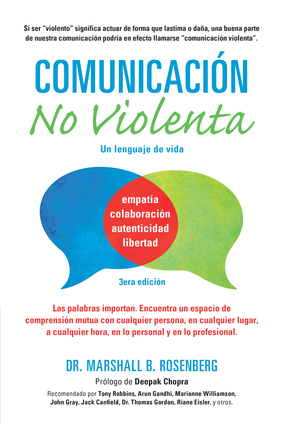Overview
What is Violent Communication? If “violent” means acting in ways that result in hurt or harm, then much of how we communicate—judging others, bullying, having racial bias, blaming, finger pointing, discriminating, speaking without listening, criticizing others or ourselves, name-calling, reacting when angry, using political rhetoric, being defensive or judging who’s “good/bad” or what’s “right/wrong” with people—could indeed be called “violent.” What is Nonviolent Communication? It's the integration of consciousness, language, communication, and means of influence and serves our desire to live with more choice, meaning, and connection, connect empathically with ourselves and others, and to share resources for the benefit of everyone.
Reviews
“Nonviolent Communication connects soul to soul, creating a lot of healing. It is the missing element in what we do.” —Deepak Chopra, author, How To Know God, on the English-language edition
“Dr. Rosenberg has brought the simplicity of successful communication into the foreground. No matter what issue you’re facing, his strategies for communicating with others will set you up to win every time.” —Anthony Robbins, author, Awaken the Giant Within and Unlimited Power, on the English-language edition
“Marshall Rosenberg’s dynamic communication techniques transform potential conflicts into peaceful dialogues and create compassionate connections. I highly recommend this book.” —John Gray, Ph.D., author, Men are From Mars, Women are from Venus, on the English-language edition
Author Biography
Marshall B. Rosenberg, PhD founded and was for many years the Director of Educational Services for the Center for Nonviolent Communication, an international peacemaking organization. He authored 15 books, including the bestselling Nonviolent Communication, which has sold more than one million copies and has been translated into more than thirty languages. Magiarí Díaz Díaz is a Certified Nonviolent Communication Trainer, translator and professional interpreter with a master's degree in peace and conflict transformation from the University of Innsbruck in Austria. Alan Rafael Seid Llamas began studying the CNV in 1995 with Dr. Marshall Rosenberg. Alan received certification as a trainer in 2003, and works privately in areas of social change, personal development, and leadership.


